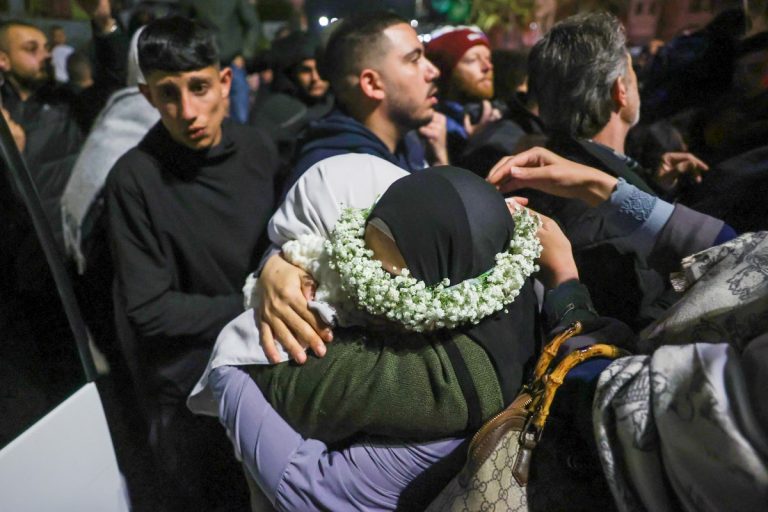Headline
Hamas To Release Four Israeli Hostages In Truce Swap

Hamas is set to release four Israeli women soldiers held hostage since its October 7, 2023 attack on Saturday, under a truce deal in the Gaza war that is also expected to see a second group of Palestinian prisoners freed.
Israel confirmed on Friday that it had received a list of names of hostages who are due to return home, though neither side has specified how many Palestinians will be released from Israeli detention if everything goes to plan.
According to the Israeli Hostage and Missing Families Forum, the women due for release are Karina Ariev, Daniella Gilboa, Naama Levy and Liri Albag.
Albag turned 19 while in captivity, while the others are all now 20 years old.
The exchange is part of a fragile ceasefire agreement between Israel and Hamas that took effect last Sunday and is intended to pave the way to a permanent end to the conflict.
Mediators Qatar and the United States announced the agreement days ahead of US President Donald Trump’s inauguration, and he has since claimed credit for securing it after months of fruitless negotiations.
READ ALSO: Israel, Hamas Agree Ceasefire Deal, Release Of Hostages
Abu Obeida, the spokesman for the Ezzedine al-Qassam Brigades, Hamas’s armed wing, said on Telegram Friday that “as part of the prisoners’ exchange deal, the Qassam brigades decided to release tomorrow four women soldiers.”
Israeli Prime Minister Benjamin Netanyahu’s office confirmed it had received the names through mediators.
Palestinian sources told AFP the releases could begin before noon (1000 GMT), though neither Hamas nor Israel has issued a statement on expected timings.
According to Israel’s prison service, some of the Palestinians released will go to Gaza, with the rest to return to the occupied West Bank.
Families of hostages held in Gaza since Hamas staged the deadliest attack in Israeli history awaited the return of their loved ones after 15 months of agony.
“The worry and fear that the deal will not be implemented to the end is eating away at all of us,” said Vicky Cohen, the mother of hostage Nimrod Cohen.
In Gaza, families displaced by more than a year of war longed to return home, but many found only rubble where houses once stood.
“Even if we thought about returning, there is no place for us to put our tents because of the destruction,” Theqra Qasem, a displaced woman, told AFP.
– Three phases –
The ceasefire agreement should be implemented in three phases.
During the first 42-day phase that began last Sunday, 33 hostages Israel believed were still alive should be returned in exchange for around 1,900 Palestinian prisoners held in Israeli jails.
Three hostages — Emily Damari, Romi Gonen and Doron Steinbrecher — have already returned home.
Ninety Palestinians, mostly women and minors, were released in exchange.
The next phase should see negotiations for a more permanent end to the war, while the last phase should see the reconstruction of Gaza and the return of the bodies of dead hostages.
READ ALSO: Hamas Police Chief Among 11 Killed In Israeli Airstrike On Gaza
During their October 7, 2023 attack on Israel, Hamas militants took 251 hostages, 91 of whom remain in Gaza, including 34 the Israeli military has confirmed are dead.
The attack resulted in the deaths of 1,210 people, mostly civilians, according to an AFP tally based on official Israeli figures.
Israel’s retaliatory response has killed at least 47,283 people in Gaza, a majority of civilians, according to the Hamas-run territory’s health ministry, figures which the UN considers reliable.
– Return to the north –
Bassem Naim, a member of Hamas’s political bureau based in Qatar, on Friday told AFP that Palestinians displaced by the war to southern Gaza should be able to begin returning to the north following Saturday’s releases.
Hundreds of truckloads of aid have entered Gaza since the ceasefire began, but its distribution inside the devastated territory remains a huge challenge.
The needs are enormous, particularly in the north, where Israel kept up a major operation right up to the eve of the truce.
In hunger-stricken makeshift shelters set up in former schools, bombed-out houses and cemeteries, hundreds of thousands lack even plastic sheeting to protect from winter rains and biting winds, aid workers say.
AFP
Headline
U.S. Lawmaker Reacts To Nigeria, U.S. Airstrikes

United States Congressman, Riley Moore, has stated that President Donald Trump is determined to put an end to the killing of Christians in Nigeria, warning that further action may follow if the violence persists.
Moore made the statement on Friday via his official X handle.
According to the lawmaker, the strike represents the first step in addressing what he described as the ongoing slaughter of Christians and the broader security crisis affecting Nigerians across religious and ethnic lines.
READ ALSO:US Dept Of War Shares Video Of Air Strikes In Nigeria
“President Trump has been clear that the killing of Christians in Nigeria must end,” he said.
He that the administration’s resolve on the matter should not be underestimated.
“As I stated at the outset: Do not test President Trump‘s resolved in this matter.
READ ALSO:JUST IN: US Forces Bomb Terrorists Camps In Nigeria
“Tonight’s strike in coordination with the Nigerian government is just the first step to ending the slaughter of Christians and the security crisis affecting all Nigerians,” he said.
He stressed that the operation signals a stronger stance by the United States in support of Nigeria’s efforts to tackle terrorism and violent extremism, noting that further measures could be taken if the situation does not improve.
Headline
US Dept Of War Shares Video Of Air Strikes In Nigeria

A video footage of the US military air strikes in Nigeria has emerged.
The video was released by the US Department of War following its air strikes against terrorists in Sokoto.
Earlier, the US secretary of War, Pete Hegseth had confirmed that military air strikes hit terrorists in Nigerians, saying it was deadly.
Later on, the US. African Command, confirmed that it conducted the attacks described as very deadly by President Donald Trump.
Trump said he was only keeping the promise he made earlier last month to strike the terrorists he believes are killing innocent Christians.
READ ALSO:JUST IN: US Forces Bomb Terrorists Camps In Nigeria
Although described as powerful and deadly, the casualty caused by the attack is yet to be released.
Explaining further, security expert, Brant Philip, said the strikes may have been launched “from the USS Paul Ignatius, using a Tomahawk missile.”
The Nigerian government through its ministry of foreign affairs has also confirmed that the strikes were successful.
Watch video here
Headline
JUST IN: US Forces Bomb Terrorists Camps In Nigeria

United States President Donald Trump said US forces conducted deadly strikes against Islamic State terrorists in northwestern Nigeria, and vowed more attacks if the militants keep killing Christians.
“I have previously warned these Terrorists that if they did not stop the slaughtering of Christians, there would be hell to pay, and tonight, there was,” Trump posted on his Truth Social platform, adding that “the Department of War executed numerous perfect strikes.”
READ ALSO:JUST IN: Kano Lawmaker, Sarki Aliyu Daneji, Dies Hours After Colleague’s Passing
Trump stated that the Department of War “executed numerous perfect strikes, as only the United States is capable of doing. Under my leadership, our Country will not allow Radical Islamic Terrorism to prosper.”
The US president wished everyone Merry Christmas, “including the dead Terrorists, of which there will be many more if their slaughter of Christians continues.”
Details later.

 News4 days ago
News4 days agoPHOTOS: New Era In Furupagha-Ebijaw As Okpururu 1 Receives Staff Of Office

 News3 days ago
News3 days agoUBTH CMD Marks 120 Days In Office, Expresses Commitment To Providing Conducive Working Environment

 News4 days ago
News4 days agoOPINION: Gumi And His Terrorists

 News3 days ago
News3 days agoFIRS Confirms NIN As Tax ID

 News4 days ago
News4 days agoFG Declares Public Holidays For Christmas, New Year Celebrations

 Metro3 days ago
Metro3 days agoFintiri Pardons Man Sentenced To Death For ‘Killing Herdsman In Self-defence’, Others

 News4 days ago
News4 days agoOPINION: Christmas And A Motherless Child

 News3 days ago
News3 days agoOPINION: My Man Of The Season

 News2 days ago
News2 days agoJUST IN: Kano Lawmaker, Sarki Aliyu Daneji, Dies Hours After Colleague’s Passing

 News3 days ago
News3 days agoKWAM 1 Withdraws From Awujale Race, Ends Court Challenge




























